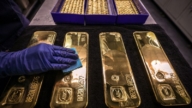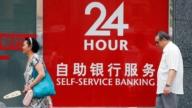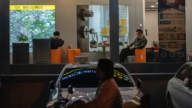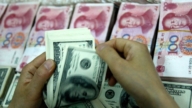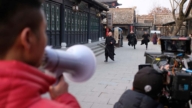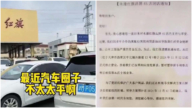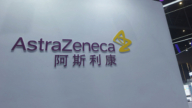【新唐人2012年7月21日訊】中共多個部委近期公布了2011年決算和2012年預算,以及行政經費、「三公」經費的支出情況。這是中共當局第二次向社會公開「三公經費」的預決算情況,也是首次分部門公開行政經費。經濟學者指出,帳表上列出的單位都屬於中央部委,這些數字本身並不能說明這個三公消費的真實數據,因為眾所周知中共在各級政府都有小金庫。
6月30號,中共人大常委會審查批准2011年中央決算後,財政部要求在20天內批復中央部門決算,到19號為止,已有92家部委在官方網站上公開了部門決算及「三公經費」等情況。
官方的媒體報導說,這是第二次向社會公開「三公經費」預決算情況,並且是首次分部門公開行政經費。
美國「南卡羅來納大學」教授謝田表示,中共當局現在開始公布這種公款吃喝,公款消費,公款旅遊,三公消費的數據,顯然是迫於中國民眾的壓力和輿論壓力的情況下,才公布出來的,但從公布的這些部分來看,並不是人們感興趣的那些部門。
美「南卡羅來納大學」教授 謝田:「人們更加有興趣去關注的可能是那些鐵道部、財政部、或者是廣電總局、電信總局、新聞總署….那些更加涉及重要的問題,更有流水、更有利益的部門的預算。我們也都知道中國政府在各地政府都有小金庫的問題,花費民脂民膏並不能從官方公布的數據中體現出來。」
所謂小金庫,也就是中共黨政各級官員可以自由支配的公款。
《美國之音》曾在一篇報導中說,所謂的小金庫並不小,容納的資金可以上萬,也可以上百萬。中共在中國各級政府部門的第一把手,可以不受制約的從賬目中向不對外公開的小金庫開支,「吃喝嫖賭都報銷」。
大陸經濟學者鄭先生:「(當局)他們知道我們知道他們在撒謊,可是他們還是堅持在撒謊。很多時候是由於一種習慣,也有很多時候是由於….,那不是一天形成的一種慣性和機制。」
數據顯示,去年,中國大陸各地各級政府的違規「小金庫」已被查處近六萬件,涉及資金266億元人民幣,各地黨政機關的違規車輛至少17萬輛。外界指出,這些數據也只是中共真實貪腐情況的冰山一角。
另外,從這次公布的2011年三公決算數和2012年三公預算數來看,不少部門三公費用不但沒有減少,反而增加。比如工信部三公經費增加1120萬元,中科院增加1769萬元,國家發改委增加908萬元。其中出國費用支出明顯上漲。國家能源局披露的2011年決算顯示,去年因公出國(境)費支出決算668.53萬元,佔「三公經費」支出的88.52%。
謝田說,全世界都知道,中共官員所謂的出國考察,其實都是旅遊。
謝田:「他們這些人的,比如到美國來,也不懂英語,實際上也沒有人去真正的接待他們,他們安排的那個行程日程,我們看到的90%的時間都是在遊山玩水,在各個景點,好吃,好喝,好玩的地方,旅遊的地方在轉,可能某一天,到某一個地方聽了某一個對口的機關機構給做了一個演講,或甚麼它就算了,這個是眾所周知的事實。」
不過,謝田指出,中國民眾最應該繼續關注的是,中共官員貪污的和轉移到海外的錢,那才是大頭。中共政權遲遲不願公布這些官員的財產收入,實際原因也在這裡。
採訪編輯/唐睿 後製/孫寧
92 Ministries and Commissions Released Their “Three Public Consumptions,” While the Hidden Coffers Remain Untold
Many Chinese Communist Party (CCP) ministries and
commissions recently released their 2011 final accounts and 2012 budgets,
along with their administrative expenses and
“three public consumptions.”
This is the second time CCP authorities have released the
“three public consumptions” data,
and the first time for individual ministries and commissions.
Economists have pointed out that the work units listed all
belong to central departments.
Thus, the data cannot reflect the real situation, because it is
known to all that the CCP has hidden coffers at each level of government.
After the Standing Committee of the National People’s Congress
examined and approved China’s 2011 final accounts on June 30,
the Treasury Department was required to reply within 20 days.
By July 19, 92 ministries and commissions have released
their final accounts and the “three public consumptions” on their official websites.
According to state-owned media, this is the second time that
budgets and final accounts of the “three public consumptions” have been released,
but the first time by individual ministries and commissions.
Xie Tian, professor at the University of South Carolina, said
that obviously the CCP has begun to release the “three public
consumptions” data under the pressure of public opinion.
But the ministries and commissions which have released their
consumptions are not the departments people are interested in.
Xie Tian: “The public is more interested in the Railways,
the Treasury, the National Broadcast & TV General Bureau, the Telecommunication Bureau, and the State Press…,
which are involved in more severe problems and
whose officials are more likely to make a fortune.
We all know that China’s local governments of all levels
have hidden coffers, so the real expenses are not reflected in official data.”
These so-called hidden coffers refer to public funds
which CCP officials of various levels are able to use at will.
According to a report by Voice of America, the amount of
capital in these hidden coffers is not small, in fact.
The balance can be in the thousands up to the millions.
The head chiefs of each level can spend the money from the
coffers in secret and without limit, to cover their “dissipated life expenses.”
Mr Zheng, economist in mainland China:
“The authorities know full well that people don’t trust them,
but they keep lying, usually from habit.
But this habit is not formed over a short period of time.”
Statistics show that nearly 60 thousand “hidden coffer” cases
of all level governments have been investigated and punished last year,
involving a total of 26.6 billion yuan ($4.17 billion)
and at least 170 thousand illegal vehicles.
The outside world believes that the released data
is only a tiny part of the widespread corruption.
Also, based on the 2011 final accounts and 2012 budgets,
many departments’ spending of public funds has increased.
For example, the Ministry of Industry and Information Technology
had its budget increased by 11.2 million yuan ($1.75 million),
the Chinese Academy of Sciences
by 17.69 million yuan ($2.77 million),
and the National Development and Reform Commission
by 9.08 million yuan ($1.4 million).
Among them, the budget for overseas trips increased drastically.
According to National Energy Board’s final accounts for 2011,
the expense for overseas trips was 6.68 million yuan ($1.04 million),
accounting for 88.52% of the total public consumptions.
Xie Tian said that everyone knows that CCP officials’
so-called overseas investigation is actually overseas traveling.
Xie Tian: “These officials come to the U.S., for example,
without knowing English and nobody will actually accommodate them.
90% of their schedule is for sight-seeing,
and hunting for good food and fun places.
They might go to a talk given by a related department someday
during their visit, and thats all it amounts to. This is well known to all.”
But Xie Tian also pointed out that Chinese people should
pay more attention to the money transferred overseas by those CCP officials and that is the biggest gap.
This is also the reason why the authorities don’t want to
release the personal income data of government officials.


